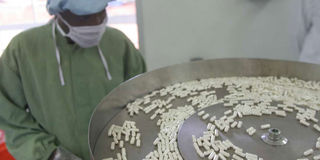Two-thirds of medicine taken locally is imported

A factory worker monitoring drugs on a production line.
Despite being the largest exporter of pharmaceutical products in the 21-country Common Market for Eastern and Southern Africa (COMESA) region, Kenya lacks the technology and capacity to produce its own medicines.
Kenya supplies 50 per cent of the COMESA market and 75 per cent of the East African Community market, according to the EAC Pharmaceutical Manufacturing Plan of Action for 2017 to 2027.
In 2015, Kenya exported pharmaceutical products worth Sh7.1 billion to Uganda, Tanzania, Malawi, Zimbabwe and Mozambique, and imported drugs worth Sh5.8 billion for domestic use from countries in Asia.
In the local market, foreign firms, mostly Asian, supply 70 per cent of drugs worth more than Sh100 billion, as public health facilities shun local drug makers over quality and price concerns.
“Kenya does not have capacity to produce its own pharmaceuticals. We lack raw materials – active pharmaceutical ingredients – which are imported from China and India,” explained Pharmacy and Poisons Board CEO Fred Siyoi, adding that the cost of importing raw materials makes it difficult for locally-manufactured medicines to compete with imported drugs from India and China, which produce their own active pharmaceutical ingredients.
OBSOLETE MACHINERY
Dr Prosper Tumusiime, who oversees health service delivery for World Health Organisation Africa regional office, said that patients find locally-manufactured medicines expensive and doubt their quality, hence higher demand for imported ones.
“Assuming the markets are open and people are willing to buy locally produced items, there will be economies of scale that will allow local companies to produce drugs at a cheaper cost and sell at a reasonable cost,” said Dr Tumusiime.
He added that WHO has a mechanism for pre-qualification which guarantees that member countries produce good quality drugs.
“Patients should not worry as the quality of local drugs will be similar to those from outside,” he said.
Moreover, according to Dr Siyoi, “many upcoming local manufacturers start with obsolete machinery because they cannot afford modern machinery, making it difficult to manufacture products of the required quality.”
HUMAN CAPITAL CHALLENGES
As a result, most local manufacturers concentrate on producing a narrow range of generic medicines.
Another challenge that hampers manufacturing of local drugs in Kenya, according to the Pharmacy and Poisons Board chief, is that human capital is not developed to World Health Organisation standards.
Until recently, the training of pharmacists in Kenya was clinical-based and these professionals took a long time to adjust to pharmaceutical industry requirements.
The government projects that the commencement of industrial pharmacy training at the schools of pharmacy may mitigate this situation.
In a bid to promote the growth of local pharmaceutical companies, the East African Community gave local drug producers a 15 per cent price preference over foreign firms, allowing them to qualify for public tenders even if they quote a higher price.
CUTTING IMPORTS
Moreover, there is a plan to cut imports to 50 per cent over a 10-year period, by adopting a policy that requires public procurement agencies to buy at least 50 per cent of their drugs from local firms.
There are also plans to have the government take financial and regulatory measures to support the expansion of local pharmaceutical drugs to cover at least 90 per cent of diseases that are prevalent locally. In Kenya, the Economic Survey released last month found that diseases of the respiratory system, malaria, skin diseases including ulcers, diarrhoea, urinary tract infections, pneumonia, accidents including fractures and burns, rheumatism and joint pains, intestinal worms and eye infections, were the most frequent conditions treated in hospitals in 2018.
To make local manufacturing viable, Dr Tumusiime spelled out the need to identify capacities in every country and have them specialise in producing particular drugs. However, Dr Tumusiime said that this would require political goodwill.



